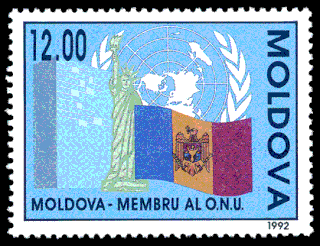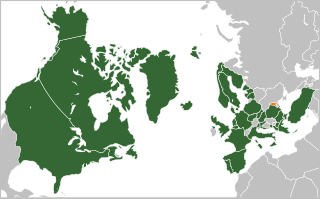The history of Moldova can be traced to the 1350s, when the Principality of Moldavia, the medieval precursor of modern Moldova and Romania, was founded. The principality was a vassal of the Ottoman Empire from 1538 until the 19th century. In 1812, following one of several Russian–Turkish wars, the eastern half of the principality, Bessarabia, was annexed by the Russian Empire. In 1918, Bessarabia briefly became independent as the Moldavian Democratic Republic and, following the decision of the Parliament, united with Romania. During the Second World War it was occupied by the Soviet Union which reclaimed it from Romania. It joined the Union in 1940 as the Moldavian SSR, until the dissolution of the USSR. In 1991 the country declared independence as the Republic of Moldova.

Transnistria, officially known as the Pridnestrovian Moldavian Republic (PMR), is a breakaway state internationally recognized as part of Moldova. Transnistria controls most of the narrow strip of land between the Dniester river and the Moldova–Ukraine border, as well as some land on the other side of the river's bank. Its capital and largest city is Tiraspol. Transnistria is officially designated by the Republic of Moldova as the Administrative-Territorial Units of the Left Bank of the Dniester or as Stînga Nistrului.

The Party of Communists of the Republic of Moldova is a communist party in Moldova led by Vladimir Voronin. It is the only communist party to have held a majority government in the post-Soviet states. It has been variously described as communist, Moldovenist, populist, Russophile, and pro-Soviet.

The politics of Transnistria, a de facto independent state situated de jure within the Republic of Moldova in Eastern Europe, take place in a framework of a semi-presidential republic, whereby the President of Transnistria is head of state and the Prime Minister of Transnistria is head of government. Executive power is exercised by the government. Legislative power is vested in both the government and parliament. Formally, Transnistria has a multi-party system and a unicameral parliament, called the Supreme Council. The president is elected by popular vote. The latest parliamentary elections were held in November 2020.
The 2004 Moldovan census was carried out between October 5 and October 12, 2004. The breakaway Transnistria failed to come into an agreement with the central government in Chişinău, and carried out its own census between November 11 and November 18, 2004. The results of the census in Transnistria were put into question.
The Jamestown Foundation is a Washington, D.C.-based conservative defense policy think tank. Founded in 1984 as a platform to support Soviet defectors, its stated mission today is to inform and educate policy makers about events and trends, which it regards as being of current strategic importance to the United States. Jamestown publications focus on China, Russia, Eurasia, and global terrorism.
The Liberal Democratic Party of Transnistria is a nationalist and right-wing populist political party in the breakaway state of Transnistria, recognized as part of Moldova. It was formed on 1 August 2006 by followers of Vladimir Zhirinovsky and is affiliated with the Liberal Democratic Party of Russia. The party leader is Transnistrian politician Valerly Kulakli.

The Trans-Caspian Gas Pipeline is a proposed subsea pipeline between Türkmenbaşy in Turkmenistan, and Baku in Azerbaijan. According to some proposals it would also include a connection between the Tengiz Field in Kazakhstan, the Sangachal Terminal in Baku, and Türkmenbaşy. The Trans-Caspian Gas Pipeline project would transport natural gas from Turkmenistan and Kazakhstan to European Union member countries, circumventing both Russia and Iran. It would do this by feeding the Southern Gas Corridor. This project attracts significant interest since it would connect vast Turkmen gas resources to major consumers Turkey and Europe.
The Trans-Caspian Oil Transport System is a proposed project to transport oil through the Caspian Sea from Kazakhstani Caspian oilfields to Baku in Azerbaijan for the further transportation to the Mediterranean or Black Sea coast. The main options under consideration are an offshore oil pipeline from Kazakhstan to Azerbaijan, and construction of oil terminals and oil tankers fleet. A strong push for the project has been from the partners of the Kashagan oilfield project and in particular Total who has a share in both the field and the BTC pipeline. They have estimated that such a project would cost roughly US$4 billion. The project also faces opposition from Iran and Russia, both alternative avenues for Kazakhstan's oil and gas who would likely object to competing pipelines being built.
White Stream is a proposed pipeline project to transport natural gas from the Caspian region to Romania and Ukraine with further supplies to Central Europe.
Moldova Steel Works is a steel-producing company in Rîbnița, in the unrecognized state of Transnistria. It accounts for more than half of Transnistrian total industrial output.

The following is timeline of the History of independent Moldova which started after the independence of Moldova.

Official relations between Moldova and NATO began in 1992 when Moldova joined the North Atlantic Cooperation Council. However, as Moldova's neutrality is enshrined in its constitution, there are no official plans for Moldova to join the organization.

The Tudor Vianu National High School of Computer Science is a public secondary school located at 10 Arhitect Ion Mincu Street, Bucharest, Romania.

Matei Socor was a Romanian composer and communist activist.

Transnistria–Ukraine relations is the bilateral relationship between the Pridnestrovian Moldovan Republic and Ukraine. Ukraine does not officially recognize the independence of Transnistria. Nevertheless, it maintains special relations with Transnistria in the political, cultural and economic spheres.

Transnistria and the United States do not have official diplomatic relations as the United States is among the vast majority of countries that does not recognize Transnistria as a sovereign nation and instead recognize the region of Transnistria as part of Moldova.

The 5+2 format, also known as the 5+2 talks, the 5+2 negotiations and the 5+2 process, is a diplomatic negotiation platform aimed at finding a solution to the Transnistria conflict between Moldova and the unrecognized state of Transnistria. It is composed of the latter two, which are designated as "parties to the conflict", and Russia, Ukraine and the Organization for Security and Co-operation in Europe (OSCE), "mediators" of the negotiations. The European Union (EU) and the United States act as "observers". The inclusion of Romania into the 5+2 format has been proposed.
The Yushchenko Plan, also referred to as the Ukrainian Plan, was a unsuccessful 2005 plan developed by then-President of Ukraine Viktor Yushchenko and Secretary of the National Security and Defense Council Petro Poroshenko in an effort to bring an end to the Transnistria conflict by peaceful means with the support of Moldova and the Organization for Security and Co-operation in Europe (OSCE).

Moldova is officially a neutral country. Neutrality is enshrined by Article 11 of the 1994 Constitution of Moldova. Adopted following Moldova's defeat in the Transnistria War in 1992, neutrality enjoys widespread support among the Moldovan population. Moldova together with Turkmenistan are the only post-Soviet states that declared neutrality after independence.












